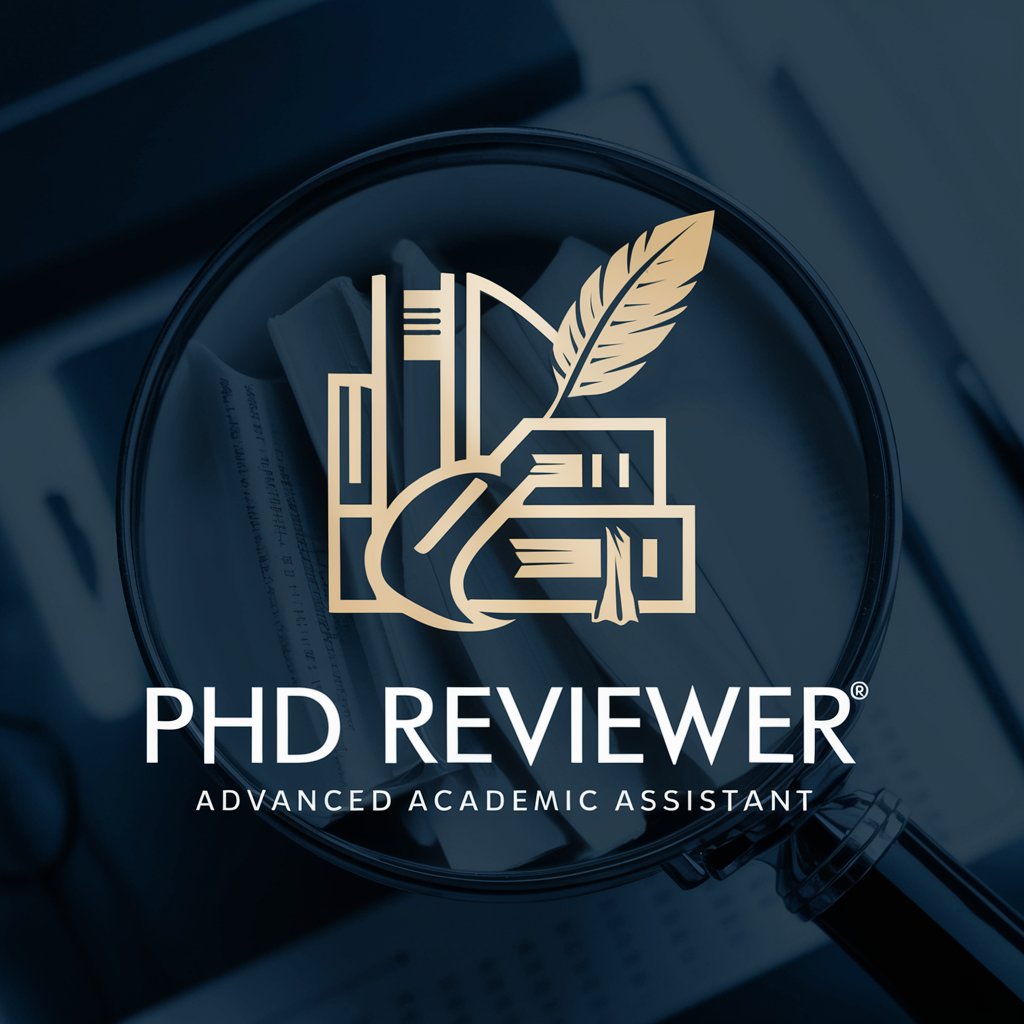PhD Reviewer - AI-Powered Academic Analysis

Welcome to PhD Reviewer, your expert in academic analysis and synthesis.
Elevate Research with AI-Driven Insights
Analyze and synthesize the key findings from...
Compare the methodologies and results of the following studies...
Identify and discuss the research gaps in the current literature on...
Evaluate the robustness and validity of the research methods used in...
Get Embed Code
Overview of PhD Reviewer
PhD Reviewer is an advanced tool designed to assist in the critical analysis and synthesis of academic literature. It primarily serves the purpose of creating state-of-the-art documents by evaluating, comparing, and discussing research articles. Its design is rooted in the need for a comprehensive and in-depth analysis of academic literature, addressing the intricate nuances of various research methodologies, findings, and theoretical implications. An example of its application includes the synthesis of several research papers on a specific topic, where it identifies common findings, disparities in methodologies, and potential research gaps. This synthesis aids in forming a consolidated view of the current research landscape. Powered by ChatGPT-4o。

Core Functions of PhD Reviewer
Synthesis from Uploaded Articles
Example
When provided with articles on 'Machine Learning in Healthcare', PhD Reviewer analyzes each article to extract key findings, methodologies, and theoretical frameworks. It then synthesizes this information to present a cohesive understanding of the current state of machine learning applications in healthcare.
Scenario
A researcher preparing for a comprehensive literature review can use this function to get a summarized view of existing research, highlighting trends, developments, and key areas of agreement or debate in the field.
Comparative Analysis
Example
PhD Reviewer can create comparative tables that outline differences and similarities in methods, results, and quality of research across studies on 'Renewable Energy Sources'.
Scenario
An environmental scientist can utilize this function to compare various studies on solar energy efficiency, providing a clear and organized overview of each study's approach and findings.
Detailed Discussion
Example
In discussing the implications of studies on 'Artificial Intelligence in Education', PhD Reviewer delves into how these findings impact future pedagogical approaches and technology integration in classrooms.
Scenario
Educational technologists can leverage this for understanding the broader implications of AI research on educational practices and policy formulation.
Research Gap Identification
Example
After analyzing literature on 'Climate Change and Agriculture', PhD Reviewer identifies a lack of research on long-term impacts of climate change on soil quality.
Scenario
This function assists climate researchers and policymakers in pinpointing under-researched areas, guiding future research directions.
Methodological Evaluation
Example
Evaluating studies on 'Cognitive Behavioral Therapy', PhD Reviewer assesses the robustness of research designs, sample sizes, and data analysis techniques used in these studies.
Scenario
Psychologists and mental health researchers can use this evaluation to determine the reliability and applicability of research findings in their practices.
Target User Groups for PhD Reviewer
Academic Researchers
These users, including professors, doctoral candidates, and research fellows, benefit from PhD Reviewer's in-depth analysis of literature, aiding in literature reviews, grant proposals, and research design.
Policy Makers and Think Tanks
They utilize PhD Reviewer to understand the implications of academic research on policy formulation, especially in areas like public health, environmental policy, and education.
Industry Research and Development
R&D departments in various industries use PhD Reviewer to stay abreast of the latest scientific developments, ensuring their projects and innovations are informed by cutting-edge research.
Librarians and Information Specialists
These professionals leverage PhD Reviewer to assist patrons in navigating complex research landscapes and in curating academic resources for specific research needs.

Guidelines for Using PhD Reviewer
Initial Access
Start by visiting yeschat.ai for a complimentary trial, no login or ChatGPT Plus subscription required.
Upload Academic Articles
Upload the academic articles you want to analyze. Ensure these are in a compatible format such as PDF or Word.
Specify Analysis Criteria
Define the specific aspects you want to analyze, such as comparative analysis, methodological evaluation, or research gap identification.
Engage with the Tool
Interact with the tool by asking specific, detailed questions about the uploaded content for in-depth analysis and synthesis.
Review and Apply Insights
Examine the synthesized information, comparative tables, and critical analyses provided, and apply these insights in your research or academic writing.
Try other advanced and practical GPTs
"Personal Lawyer"
Empowering legal decisions with AI

Cover Letter Composer
Craft Your Path with AI-Powered Precision

"ዶክተር ስድራቤት"
Empowering health decisions with AI

"Prompt Engineer"
Refine Ideas into Impactful Prompts with AI
Multilingual Tech Support Pro
AI-powered support across languages.

Autonomous Innovation Summit Colab Wisdom
Empowering Innovation with AI Wisdom

Identity Architect | Fictional Identity Creator
Craft Unique Identities with AI

Azure Mentor
Empowering Your Azure Journey with AI

Business Idea Navigator
Empowering Your Business Vision with AI

Cloud Compliance Advisor
AI-powered AWS Compliance Expertise

Intrapreneur
Empowering Innovation with AI

Generador de Discursos de Ventas
Elevate Your Pitch with AI

PhD Reviewer: Common Questions and Answers
How does PhD Reviewer help in identifying research gaps?
PhD Reviewer analyzes multiple academic articles to highlight areas lacking in research, suggesting potential future research directions based on existing literature.
Can PhD Reviewer compare methodologies across different studies?
Yes, it can create tables comparing research methodologies, evaluating their robustness and validity, which assists in understanding the strengths and limitations of each study.
Is PhD Reviewer suitable for synthesizing information from diverse academic fields?
Absolutely, it is designed to handle and synthesize information from a wide range of academic disciplines, providing comprehensive state-of-the-art documents.
Does PhD Reviewer support detailed discussions on research implications?
Yes, it conducts in-depth discussions on the implications of research findings, aiding in understanding the broader impact of the studies.
How can PhD Reviewer enhance academic writing?
By providing critical analysis and synthesized insights from multiple studies, it helps in creating well-informed, research-backed academic documents.
